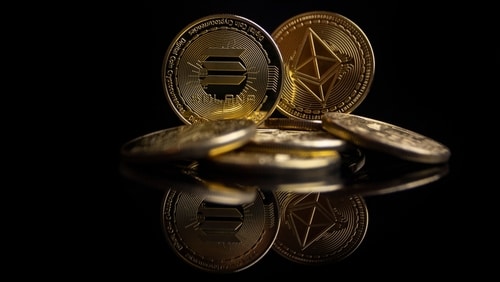Ethereum is the biggest proof-of-stake (PoS) crypto network. However, it faces competition from other PoS networks, one of which is Solana.
Both of them are platforms for all things web3, and are booming well as the ecosystem continues to grow. As similar as they are, there are also differences between the two networks that are noteworthy.
In this guide, we will highlight these differences as well as their strengths and weaknesses to help you decide on which network is better for developing applications or investment.
What Is Ethereum (ETH)?
As stated earlier, Ethereum is the largest PoS network in the crypto industry. The network has the highest number of developers and decentralized applications. Initially launched as a proof-of-work (PoW) network, it has always supported smart contracts and decentralized applications.
However, the network has been affected by issues such as low scalability, slow transactions and high fees. To address these issues, the network recently migrated from PoW to PoS consensus, which was supposed to make it more efficient.
The issues with Ethereum still continue to persist nonetheless, and this has led to new PoS networks emerging to offer faster and cheaper alternatives.
The Ethereum network uses its native token, ETH to pay for transaction fees. Every transaction on the network that requires gas fees needs ETH to settle. The token is also used for staking to secure the network.
Holders of the token also have a right to vote on proposed changes to the network, which empowers them to be part of the governance of the network. ETH has a circulating supply of 120 million, same as the total supply.
This is because the tokens are pre-mined, and only need to be released into circulation unlike PoW assets. Apart from its use on the Ethereum network, ETH is also held as an investment asset among crypto investors.
What Is Solana (SOL)?
Solana is a PoS network often referred to as the Ethereum Killer. It is named so because of its high scalability, high speed, and low transaction fees. Solana was launched as an alternative to Ethereum, providing the same services but with better efficiency.
As a result of its high efficiency, the network has grown rather rapidly to become one of the best performing among the top ten assets. The efficiency lies in proof-of-history (PoH), an additional consensus mechanism to the traditional PoS which gives it better scalability and keeps the network from getting congested.
Many developers have migrated from Ethereum to Solana, especially those just starting out with little funding. SOL is the native currency used on the network to pay for all transactions.
The token is also used for staking to secure the Solana network. SOL is also used to incentivize validators for their service. Holders of the token also participate in governance by voting on network proposals for the future growth of the network.
Interestingly, SOL has an infinite supply which makes it an inflationary currency. This means more of the token will continue to be released with no limit in supply. While ordinarily this would make the token less valuable, SOL has grown remarkably nonetheless.
It has been one of the best performing assets among the top ten for a while, which is why many investors still hold it as an investment asset with much potential.
Which Is Better?
Answering this question will require answering other questions first. For example, what do you wish to use the project for? If you’re a developer looking for an efficient and scalable network to build, Solana would definitely be the right choice, even though Ethereum remains way more secure.
On the other hand if your goal is to get a token you can buy and hold as an investment, SOL may be the better choice even though Ethereum holds much potential too. This is because many more people are running to Solana and the token is likely to be used more in the future, making it more valuable.
At Tokenhell, we help over 5,000 crypto companies amplify their content reach—and you can join them! For inquiries, reach out to us at info@tokenhell.com. Please remember, cryptocurrencies are highly volatile assets. Always conduct thorough research before making any investment decisions. Some content on this website, including posts under Crypto Cable, Sponsored Articles, and Press Releases, is provided by guest contributors or paid sponsors. The views expressed in these posts do not necessarily represent the opinions of Tokenhell. We are not responsible for the accuracy, quality, or reliability of any third-party content, advertisements, products, or banners featured on this site. For more details, please review our full terms and conditions / disclaimer.



